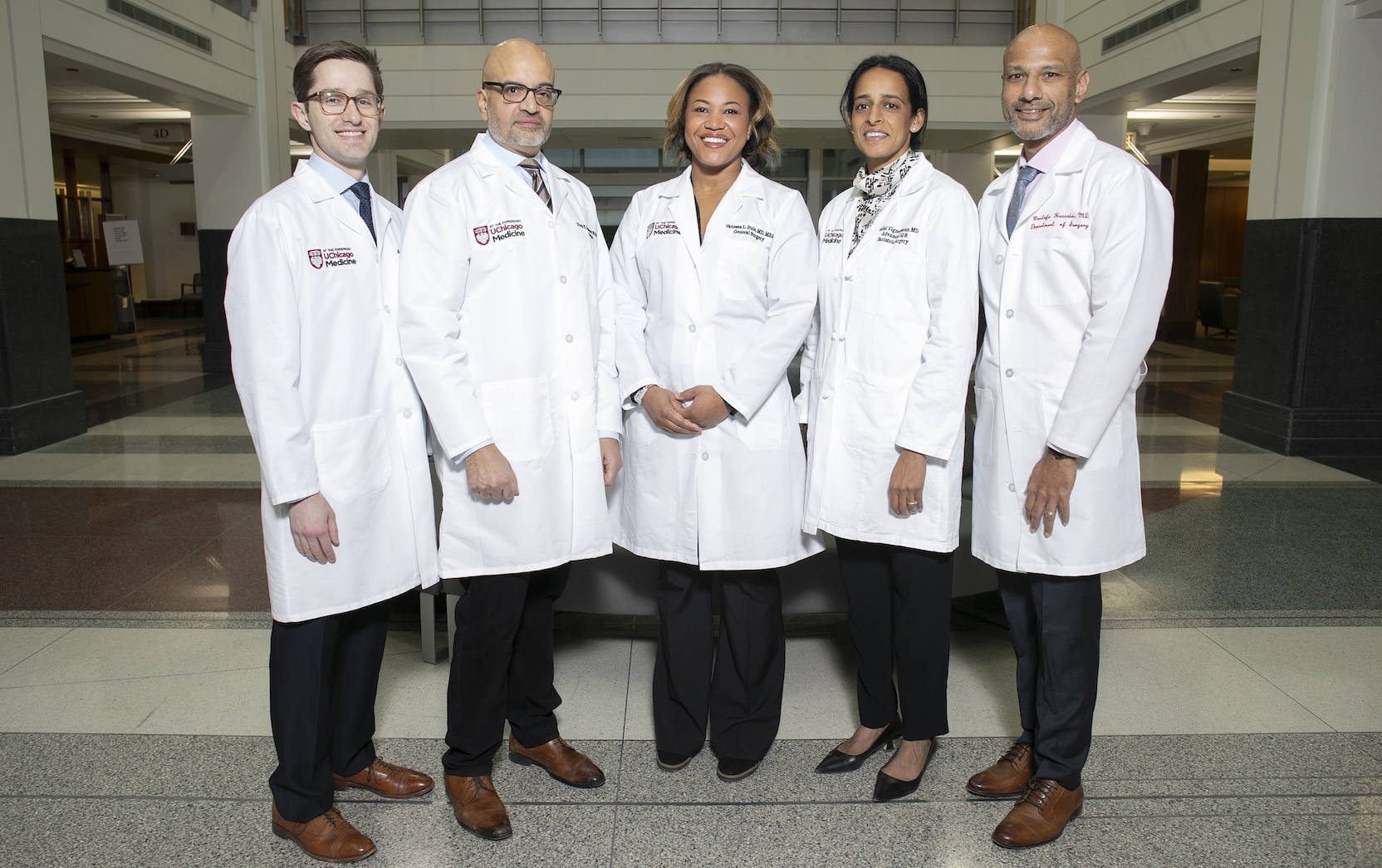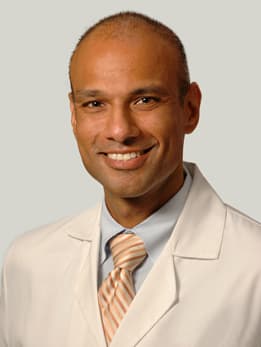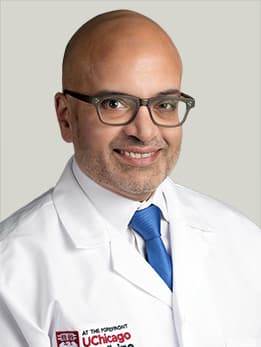Hernia Care
Comprehensive Hernia Care
At the University of Chicago Medicine, we believe every patient is unique, and our experienced surgeons offer a diverse range of surgical techniques to provide tailored treatment for every patient, including those with complicated conditions that cannot be treated elsewhere. Our team is nationally recognized for advanced hernia surgery and personalized care.
Using a multi-disciplinary approach, we strive to help our patients achieve the best possible outcomes from their hernia surgery. It is our goal to provide excellence in hernia care, serving the city of Chicago and beyond.

What is a hernia?
A hernia is a weakness or hole in the muscles of the abdomen through which soft tissue, such as fat or intestines, can pass through.What are the symptoms of a hernia?
Hernias may appear as an asymptomatic bulge, or they may cause discomfort or pain. When the intestines are trapped in the hernia, the bowels can become obstructed or blocked, which may require surgery to relieve the obstruction.
In some cases, the blood supply to herniated bowel can be interrupted, known as strangulation, and this can cause the affected bowel to die. This can result in a life-threatening infection that requires emergency surgery.
When does a hernia need to be fixed?
Some hernias, such as small, asymptomatic inguinal (groin) or umbilical (belly button) hernias, can be safely observed, provided your surgeon agrees it is safe to do so.
A hernia should be repaired if it is symptomatic (e.g. pain, obstructive symptoms), enlarging, interfering with mobility or abdominal wall function, or at increased risk of emergent complications.
When to seek emergency medical attention:
- Severe pain, swelling, or redness at the hernia site
- Nausea or vomiting
- Constipation, bloating, or inability to pass gas
- Fever
How are hernias treated?
Hernia surgery can be performed using open and minimally invasive techniques. In general, the surgery involves returning the hernia contents back to the proper location, closing the hole in the muscle, and reinforcing the closure with a permanent or temporary mesh.
What conditions do you treat?
- Incisional hernia
- Ventral hernia and umbilical hernia
- Inguinal and femoral hernia
- Parastomal hernia
- Flank and lumbar hernia
- Loss of domain
- Rectus diastasis
- Sports hernia
- Chronic groin pain
- Hiatal hernia and paraesophageal hernia
- Diaphragm hernia
Treatment Options
Minimally invasive hernia repair uses multiple small incisions to access the hernia. The abdomen is inflated with gas and the hernia is repaired with the assistance of a small camera, called a laparoscope, and specialized instruments.
The advantages of minimally invasive surgery include the potential for less scarring, less postoperative pain, lower risk of wound infection, and shorter hospital stay/return to normal activities. However, not all patients are candidates for minimally invasive hernia repair.
Minimally invasive techniques include both laparoscopic and robotic-assisted approaches.
Complex abdominal wall reconstruction
Abdominal wall reconstruction involves separating, and in some cases dividing, the muscles of the abdominal wall to reduce tension and close large hernia defects.
Depending on the nature and anatomy of your hernia, this can be performed open or using a robotic-assisted approach.
Sports hernia
Sports hernia repairs address chronic groin pain often related to repetitive stress or injury. Treatment is tailored to your diagnosis and may involve minimally invasive surgery.
PoRSHA
At the University of Chicago, our surgeons have pioneered a new technique for the repair of hiatal and paraesophageal hernias using the patient’s own tissue to reinforce their repair. Learn more.
Mesh-free hernia repair
Depending on the type and anatomy of your hernia, mesh-free options may be considered, if preferred.
Preparing for Surgery
After you request an appointment, or if a referral is placed, you will be scheduled for a meeting with one of our hernia team members. During this visit they will review your medical history and provide recommendations for the management of your hernia.
At this visit you should be prepared to discuss:
- Your symptoms
- Your medical history
- Questions you have about your hernia and its treatment
Depending on the extent of the planned operation and your overall fitness for surgery, your surgeon may request you make modifications to your lifestyle to decrease your risk of surgery. Potential areas of intervention may include:
- Smoking cessation
- Daily exercise
- Optimizing blood sugar control
- Consultation with other services:
Day of Surgery
Make sure to follow any preoperative instructions from your surgical team (i.e. holding any medications, not eating the day of surgery). If your procedure requires a stay in the hospital, make sure to bring anything you will need during your stay.
Recovery After Surgery
After surgery, most patients are asked to avoid lifting more than 15 lbs for at least two weeks after surgery. Depending on the type and nature of your operation, your surgeon will provide specific instructions for your activity.
Most patients are encouraged to walk after surgery, as early as they are able.
Your timeline on returning to work will depend on the nature of your job and the extent of your surgery.
Most patients take one to two weeks off work for their recovery, though those with highly physical jobs or undergoing complex repairs, a longer leave from work may be required.
Why Choose Us
- Academic medical center and quaternary referral center
- Expertise in repairing complex and recurrent hernia
- Robotic and minimally invasive techniques that allow for outpatient recovery in select cases
- Mesh-free options or alternatives when appropriate
- Multiple convenient locations throughout the Chicagoland area
Our Experts
Our Locations
Request an Appointment
We are currently experiencing a high volume of inquiries, leading to delayed response times. For faster assistance, please call 1-888-824-0200 to schedule your appointment.
If you have symptoms of an urgent nature, please call your doctor or go to the emergency room immediately.
* Indicates required field






